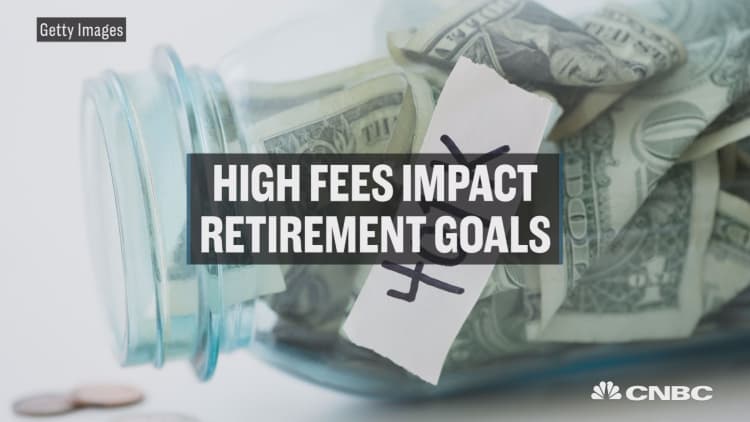The next time you're thinking of saving time by using an ATM that's out of your banking network, do yourself a favor and keep walking.
Americans could be paying more than $369,000 in fees over their lifetime for their workplace retirement plans, individual retirement account plans, and checking and savings accounts, according to an analysis by NerdWallet, a personal finance site.
The site also performed an online survey of 2,036 adults in June, asking participants about the steps they will — or won't — take to save on costs.
More from FA Playbook:
Use this charitable contribution to get tax benefits now
Investors worst nightmare may be themselves
Yield-curve hysteria is much ado about nothing
"The really interesting thing to come out of the survey is the number of things people aren't willing to do to avoid these fees," said Arielle O'Shea, an investing and retirement specialist at NerdWallet.
"It's annoying in the moment, but it will save you a lot of money, considering how fees can compound over time," she said.
Here's how you can dodge some of those pesky extra costs.
Cost of convenience
It can cost you $2 to $3 to withdraw money from an ATM that's in a different banking network, according to GoBankingRates.
A majority of Americans are willing to eat the fee in order to get access to their money, NerdWallet found. Fewer than 3 out of 10 would walk three more blocks to use their bank's ATM, while 36 percent are willing to drive an extra mile to do so.
Banks may be willing to waive their monthly maintenance fees — which can be as high as $12, according to GoBankingRates — if you have your paycheck sent to your checking account via direct deposit.
Be aware that banks may hit you with a monthly fee if you fail to maintain a certain balance in your checking account, too.
Another fee that may be worth dodging: A $1 to $3 a month cost for paper statements, according to ValuePenguin, a personal finance site.
A $35 cup of coffee
Consider turning off your bank's overdraft protection feature, said O'Shea.
Here's how it works: When you're short on money and use your debit card for a purchase, the bank may allow the transaction to proceed, resulting in an overdraft fee of about $35 per incident.
This is where the infamous "$35 cup of coffee" comes from.
Banks offer a service known as "overdraft protection" to help clients who are short on funds, allowing them to tap an overdraft line of credit or to use a linked savings or checking account as a backup.
This service isn't free: You could be paying up to $10 for the transfer.
If you turn down your bank's overdraft program altogether, then your transaction will merely be declined at the register when you're short and you won't be assessed a fee.
401(k) and IRA

Perhaps the most pernicious fees are the ones you don't see every day: They're in your 401(k) plan and IRA, and you're probably tossing your quarterly statements.
"People don't realize that these expense ratios are coming out of their accounts," O'Shea said. "Nobody is sending you a bill with the fees."
Fewer than 1 in 5 individuals are willing to do a little research and learn how to study their investment fees, NerdWallet found.
The cost of investing in a 401(k) has been on the decline, particularly as index mutual funds and exchange traded funds become a regular part of the plan menu.
See below for a chart comparing total plan expenses in 2009 to 2015.
Consider selecting the cheapest mutual funds for your IRA, brokerage accounts and 401(k) plan, O'Shea explained.
"With high expense ratios, you lose out on the compounded return of your funds," she said. "Try to lower those fees as much as possible."





